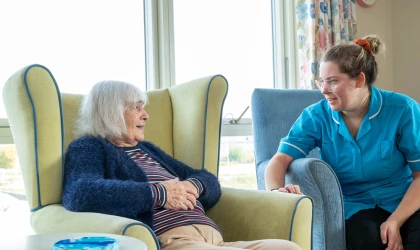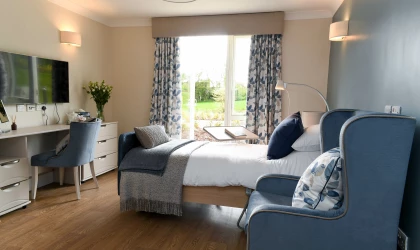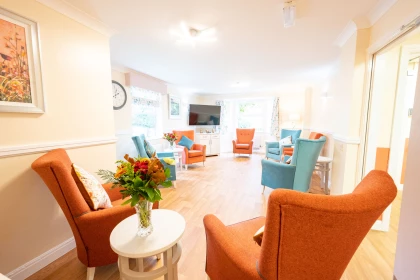

Choosing the Right Care Home
Looking for a care home for yourself or your loved one can be a very emotional and traumatic time.

You may be apprehensive that you or your loved one needs residential care support and have doubts about whether you’re doing the right thing. This is perfectly normal and a place where many families find themselves, and we at Kingsley understand that. After all, the Kingsley Healthcare Group has been established in the retirement home sector, across the UK, since 1999 and has provided first-class care and support to countless residents and their families.

Kingsley Healthcare is here to help and offer emotional support and practical guidance. To help you choose the right care home we have pulled together information that we believe will be useful in your deliberations. We hope this will help you understand the process of choosing the right care for you or your loved one. As care home providers and specialists, we understand what matters most for the residents and their families, including the available financial support.
We’ve also provided a helpful list of organisations that you can turn to for more information.
Please feel free to get in touch with any of our care home managers across the UK, either via email or telephone; we are more than happy to help you with any questions or concerns that you may have. You’re also very welcome to come and visit one of our care homes, where we can discuss your queries over a cup of tea, and you can take a good look around and talk to our residents.
Debbie McGovern
Operations Director
Where to start

First, think about the important questions you want to ask about your future care and how you want to spend your time.
It’s essential to consider your needs and expectations and ask what you want from your care home. What services does the home need to provide? Will you be treated with respect and, most importantly, will you be happy? Will your individual needs, likes and dislikes all be taken into account?
Important questions
Be prepared to consider what type of care is needed for you or your relative. Ask yourself:
- Does your relative need specialist dementia care?
- Would a home that offers nursing care be more suitable?
- What are the facilities and activities that are on offer for residential care?
- Does the home offer respite care for short breaks?
- How far away would you be willing to travel to the home?
- What area would you like the home to be in?
- How will the care be funded?
If you’re searching on behalf of someone other than yourself, ask them these questions too.
Quality of care is key, so you should also ask whether the care home has a compliance team working alongside the managers to ensure you’ll always receive the highest quality service to give you and your loved ones peace of mind.
Researching care homes

Once you have considered these questions, the next step is to find the ideal home. The best way to do this is to search online and search for care homes in your desired locations. The Care Quality Commission (CQC) site is very useful as it lists the standards of every care home across the UK. Many other sites can give you more information and ratings of the homes.
Below we have provided a list of helpful organisations that give advice and information about selecting the right care. Other factors in choosing a care home could be care home recommendations, the care home groups’ range of locations and word of mouth. Social media platforms also have a wealth of information.
Once you have picked the homes you particularly like and can imagine you or your relative living there, contact the home, book a visit and request a brochure.
Useful organisations to contact
| The Care Quality Commission (CQC) | This is the authoritative professional body responsible for ensuring homes are managed to the highest standard, and they have the power to close or cap non-compliant homes. |
|---|---|
| Which? | Which gives free, independent and practical advice about caring for older people across the UK. This includes dealing with common concerns, options for housing and residential care and how these can be financed. |
| The NHS website | The NHS website provides a comprehensive health information service that puts you in control of your health care. The website helps you make choices about health – from lifestyle choices, such as smoking, drinking and exercise, to finding and using NHS services in England, including care homes. |
| Age UK | Age UK provides a treasure trove of information and advice for older people and their relatives. |
| Alzheimer’s Society | This organisation works to improve the quality of life of people affected by dementia in England, Wales and Northern Ireland. It uses the personal experiences of health professionals and people with dementia to help guide their work and enrich the lives of those with dementia. |
| Rethink Mental Illness | Rethink Mental Illness offers advice, information and support to people affected by mental illness and their families, carers and friends. |
| The Patients Association | The Patient’s Association is an independent charity that works with the government and a broad range of individuals and organisations to develop better, more responsive health services. |
| Gov.uk | The Gov.uk website is the best place to discover government services and information. |
Useful tip

Visit as many different residential homes as possible and pick a time likely to present the home authentically, such as lunchtime; this will allow you to witness the home at its busiest.
Also, always request a brochure, which you can keep as a reminder and something to refer back to during your search. Go with a list of questions and gauge how receptive and open to answering them the staff are. If you have a particular hobby or interest, are partial to a game of bingo or bridge, or enjoy spending time outside, make sure the facilities and activities on offer match how you like to spend your time.

Essential information when choosing the right care home...
There are many excellent and well-managed care homes across the UK. However, it’s still essential to gather plenty of resourceful information and use your intuition to pick the home that best suits you.
Reliable information you can trust
Ask the local GP what they would recommend; they will always want the best for their patients, and they are excellent sources of reliable information. Alternatively, read the CQC reports on the home from its website.
Facts not fiction
Did you know there is no minimum training requirement to work as a support worker? However, a good care home will always invest in regular staff training to ensure they are skilled and equipped with the knowledge to provide a high standard of care. A recognised caring qualification to look for is the NVQ Level 2, which equips staff with the correct skills required.
Intuition
Have you ever met someone and instantly warmed to them or, in some cases, found yourself not so keen on a person? Use this intuition to get a feel for the home and the staff. Try to imagine what it would be like living there.
Does it feel homely? Are the rooms well designed, and is the décor bright and inviting? Do you feel relaxed and welcomed? Are the staff friendly and kind? Or, more importantly, are they approachable enough to form a trusting relationship?
Observe and see for yourself how the staff handle and communicate with the residents - are the residents comfortable and relaxed? Also, look at the home’s facilities; is it spotless, is it warm and welcoming, or does it seem sterile? The look and feel of a home can give many clues as to how it is managed.

Here are some questions to ask yourself when visiting a care home:
- Is the home clean and homely with decorative touches?
- Are visitors always welcome?
- Are the staff passionate about their work and the residents?
- Are there flexible mealtimes, and are relatives welcome for these?
- What activities are on offer for the residents?
- Can I personalise my room?
- What is the staff interaction with residents like?
- Do the residents look happy and content?
Person-centred care
If you type ‘find a care home near me’ into a search engine online, you’ll be given pages of search results. So how do you know what words and phrases to look for on the list? We recommend looking for the phrase person-centred care. It’s used in the care sector to assess an individual’s needs and interests. All care homes should provide this. The staff will show that they want to get to know the person as an individual and appreciate that all residents are unique with their own history, habits and hobbies. A good care home can accommodate everyone’s tastes and personalities, for example, whether you’re an early bird or night owl, introvert or extrovert.
As well as individual medical needs, you may find that some homes ask about the life history of the resident, such as what their working and family life was like, what hobbies they enjoy and what they prefer to do for entertainment, even down to the smallest details like how many sugars they take in their tea. This is encouraging and shows that the staff want to get to know the resident’s personality to create a lifestyle within the home suited to that person. This knowledge also helps the carer understand and connect quickly and effectively with the new resident and, most importantly, helps the resident feel comfortable, understood and at home.

Choosing a home with the right type of care
There are two main types of care homes – residential and nursing homes. Some care homes offer both services.

How do you make the right choice?
Deciding on the care home that suits you or your relative can seem an overwhelming and lengthy process. This decision is one of the most important that you will make, and future happiness, comfort, and overall quality of life are key.
To assess the quality of your future home, be prepared to gather as much information about the prospective care homes. Most importantly, visit several different types of residential homes for comparison - this can help build confidence in making a decision.
It’s helpful to record your experience with each home and revisit your preferred choices, perhaps taking another person for a second opinion. This also gives you another chance to ask any forgotten questions and to visit at a different time of the day/night to get a broader sense of the home, staff and overall setting.
If you’re looking for advice on funding we have some helpful advise here, visit Age UK, the Alzheimer’s Society or contact your local authority.






